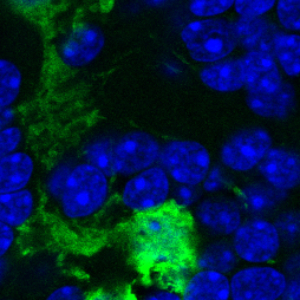Developmental Origins of Pediatric Cancer
The DKFZ Junior Research Group “Developmental Origins of Pediatric Cancer” headed by Lena M. Kutscher, PhD, is part of the DKFZ research program "Functional and Structural Genome Research".
Our group is focused on understanding how aberrations in normal neurodevelopment can lead to pediatric brain cancer. We are particularly interested in understanding how driver mutations in the cell-of-origin cause pediatric medulloblastoma. We also focus on hereditary predisposition to childhood cancer.
Because no single model completely recapitulates normal human brain development, our group uses a combination of mouse models, human induced pluripotent stem cells, and patient-derived xenograft (PDX) models to investigate the interplay between neurodevelopment and tumorigenesis.

Spotlight - JRG Kutscher
Induced pluripotent stem cells in cancer research
An iPSC is a so-called "pluripotent" stem cell that can differentiate into virtually any cell in the body, including cells of the brain. iPSCs can be derived from skin or blood cells and then "induced" in the laboratory to become pluripotent...
- In vitro models of development and brain tumors
Because pediatric tumors may arise from a block in development, understanding normal progenitor cell differentiation is a crucial first step to understanding tumor formation. To study normal development, however, we need appropriate experimental tools and models. We are establishing better models for cerebellar development and disease, using induced pluripotent stem cells, organoid technology, and directed differentiation of progenitor cells. We use these models to create tumor-prone progenitor cells and study their transformation to malignancy.
- In vivo models of tumorigenesis
To complement our in vitro studies, we use genetically engineered mouse models and in utero electroporation to understand how mutations in precursor cells alter neural development and tumorigenesis in mice. We focus on genes that are recurrently mutated in human tumors to understand the mechanistic underpinnings of these mutations. The models and mechanisms uncovered will be further investigated preclinically in collaboration with other groups at KiTZ
- Schloo C and Kutscher LM (2023) Modeling brain and neural crest neoplasms with human pluripotent stem cells Neuro-Onc (doi.org/10.1093/neuonc/noad034)
- Okonechnikov K, Joshi P, Sepp M, Leiss K, et al (2021) Mapping pediatric brain tumors to their origins in the developing cerebellum. bioRxiv (doi.org/10.1101/2021.12.19.473154)
- Kutscher LM, Okonechnikov K, Batora NV et al. (2020) Functional loss of a noncanonical BCOR–PRC1.1 complex accelerates SHH-driven medulloblastoma formation. Genes Dev. 34:1161–1176.


